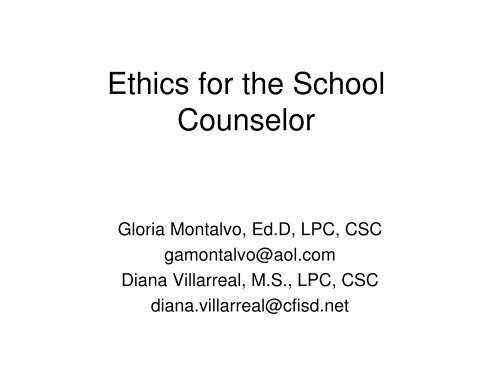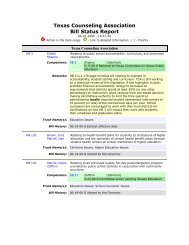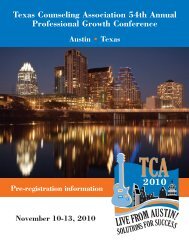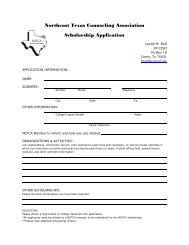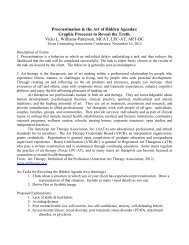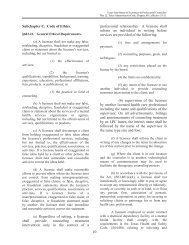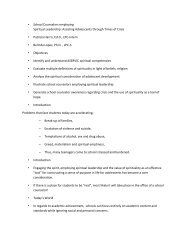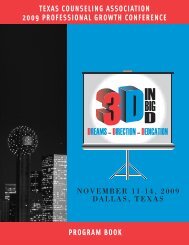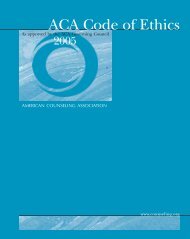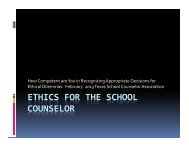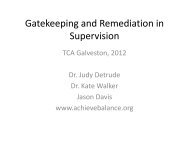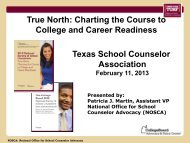Ethics for the School Counselor - Texas Counseling Association
Ethics for the School Counselor - Texas Counseling Association
Ethics for the School Counselor - Texas Counseling Association
- No tags were found...
You also want an ePaper? Increase the reach of your titles
YUMPU automatically turns print PDFs into web optimized ePapers that Google loves.
<strong>Ethics</strong> <strong>for</strong> <strong>the</strong> <strong>School</strong><strong>Counselor</strong>Gloria Montalvo, Ed.D, LPC, CSCgamontalvo@aol.comDiana Villarreal, M.S., LPC, CSCdiana.villarreal@cfisd.net
What is <strong>Ethics</strong>?• <strong>Ethics</strong> is <strong>the</strong> discipline dealing with what isgood and bad and with moral duty andobligation (Webster, 2012).• “<strong>Ethics</strong> are agreed-upon values, norms,customs and mores that have withstood<strong>the</strong> test of time (Fischer & Sorenson,1996)” (Stone, 2009)
What are Ethical Codes?Ethical codes and behavior are <strong>the</strong> result ofvalues within a profession or organizationbind those who, by membership, ascribeto <strong>the</strong>m (Stone, 2009).
What are Legal Standards?Legal standards are laws that are passedby federal and state legislators and areinterpreted by judges to set <strong>the</strong> minimumstandard or guide that a society will accept(Hermann, Remley, and Huey, 2010).
Where are laws found?• The US Constitution• Federal statues• State statues• Case law• Judge made law (common law)• State codes or regulations• <strong>School</strong> Board policies
To which Ethical Codes do<strong>Texas</strong> <strong>School</strong> <strong>Counselor</strong>s adhere?<strong>Texas</strong> Administrative CodeTitle 19 EducationPart 7 State Board <strong>for</strong> Educator CertificationChapter 247 Educators Code of <strong>Ethics</strong>
To which Ethical Codes do<strong>Texas</strong> <strong>School</strong> <strong>Counselor</strong>s adhere?<strong>Texas</strong> State Board of Examiners ofProfessional <strong>Counselor</strong>sAbout <strong>the</strong> Profession-Code of <strong>Ethics</strong>American <strong>School</strong> <strong>Counselor</strong>s <strong>Association</strong>Ethical Standards <strong>for</strong> <strong>School</strong> <strong>Counselor</strong>s
Three Ethical StandardsTopic SBEC LPC ASCADefine <strong>the</strong> associationTenets of associationPurpose of standardsXXXDeceptive practicesMisuse of funds or equipment<strong>for</strong> personal gainBorrow moneyXXXXAccept gifts X X
Three Ethical StandardsTopic SBEC LPC ASCARecord Keeping X XGuidelines <strong>for</strong> SolepossessionrecordsFollow laws and policies X X XGood moral characterPossess proper credentials X X XLimitation of credentialsOutline treatment plan:purpose, goals, techniquesRules <strong>for</strong> group workData driven evaluation ofprogramXXXXXXX
Three Ethical StandardsMake action plan <strong>for</strong> successCollaborate with professionalsCareer awareness and postsecondaryplansEvaluation, assessment andinterpretationDrug useTopic SBEC LPC ASCAReveal personal in<strong>for</strong>mation aboutcolleagues if required by lawMake false statementsFair to colleagues (sex, race, etc.) X XXXXXXXX
Three Ethical StandardsTopic SBEC LPC ASCANo retaliation against complaint filerConfidentiality as required by law X X XFERPACollaborationTransfer of in<strong>for</strong>mation (suicidalideation)Limitations (age or developmental)Confidentiality limitations in groupor classroom guidanceIn<strong>for</strong>med consent (Limits toconfidentiality)XXXXXXXX
Parents rightsDuty to warnThree Ethical StandardsTopic SBEC LPC ASCAHow to warn about fatal diseaseDanger to self or o<strong>the</strong>rsFair to students (sex, race, etc.) X XNo physical abuse or neglectSexual/romantic contact X` X XDuty to report sexual misconductDisciplinary action <strong>for</strong> failure toreport sexual misconductDual relationships X XXXXXXXX
Three Ethical StandardsTopic SBEC LPC ASCAOffer services to ano<strong>the</strong>r’s clientMake appropriate referralsRelease in<strong>for</strong>mation X XProvide drugs to studentsAppropriate use of technologyCyberbullyingInappropriate communication withuse of technologyCost of treatmentIn<strong>for</strong>m of any changesTerminate treatment X XXXXXXXXXX
Three Ethical StandardsTopic SBEC LPC ASCAReport changes to personal dataIn<strong>for</strong>m client on how to reportprofessional violationsRules <strong>for</strong> establishing practiceRules <strong>for</strong> advertising practiceResponsibilities to school,communities and familiesResponsibilities to selfResponsibilities to professionContribution to professionDecision making modelXXXXXXXXXX
Case StudyYou have noticed that one of <strong>the</strong> counselors inyour office has been grumpy, has been rude tostudents, and has ignored requests <strong>for</strong>counseling. You have noticed weight loss andhair loss in this person. You have observedunfocused behavior at department meetings,and ano<strong>the</strong>r colleague complaint that thiscounselor has failed to cooperate on a jointassignment. These behaviors are contrary to thisperson’s usual behaviors.
What is a Moral Principle?A moral principle is a belief thatdemonstrates right behavior and isaccepted by <strong>the</strong> majority of <strong>the</strong> group.Carolyn Stone (2009) explains <strong>the</strong> use of K.S. Kitchener’s five moral principles as anaid to ethical decision making.
Kitchener’s Five Moral PrinciplesAutonomy:<strong>the</strong> freedom to choose your path
Kitchener’s Five Moral PrinciplesBeneficence:<strong>the</strong> ability to promote <strong>the</strong> good of o<strong>the</strong>rs
Kitchener’s Five Moral PrinciplesNonmaleficence:not to harm or exploit
Kitchener’s Five Moral PrinciplesJustice or fairness:equal treatment
Kitchener’s Five Moral PrinciplesLoyalty or fidelity:staying connected and keeping promises
Case StudyIn <strong>the</strong> course of a meeting to discuss astudent’s progress, a school counselorattributes Jodie’s lack of progress to hislazy behaviors. The counselor states thatJodie seldom completes classassignments and or homework. Shepresents evidence of <strong>the</strong>se behaviors. Theparents accuse <strong>the</strong> counselor ofdefamation.
Thirteen Complications of Working with Minorsin a <strong>School</strong> Setting (Stone, 2009)<strong>Counselor</strong>’s ValuesObligations Beyond <strong>the</strong> StudentMinor’s Developmental and Chronological LevelsPrivacy Rights of MinorsLegal Status of MinorsIn Loco ParentisCommunity and Institutional StandardsAcademic InstructionTrusting RelationshipsIn<strong>for</strong>med ConsentOpacity of Laws and Ethical CodesNumber of Student ClientsStandard of Care
<strong>Counselor</strong>’s Values• The right to pray• The right to an abortion• The right of gay/lesbians to meet at school• The right of students to get contraceptives• The right to oppose abortion
Obligations Beyond <strong>the</strong> StudentLegal and ethical responsibilities to <strong>the</strong>parents, <strong>the</strong> school, <strong>the</strong> community, <strong>the</strong>teachers, administrators, <strong>the</strong> schooldistrict, and o<strong>the</strong>r students are allobligations beyond <strong>the</strong> student.Laws and court decisions give parents manyrights.
Minor’s Developmental andChronological LevelsAbility levelVocabularyAgeMaturity
Privacy Rights of MinorsThe privacy rights of minors legally belong to<strong>the</strong>ir parents.Refer to <strong>the</strong>se two federal laws: FERPAand HIPAA
Legal Status of MinorsAge 18 is generally when <strong>the</strong> rights of <strong>the</strong>parent transfer legally to <strong>the</strong> child.Parents have <strong>the</strong> power to agree tocounseling <strong>for</strong> <strong>the</strong>ir child.Some states allow minors to become “legallyemancipated.”
In Loco ParentisIn Loco parentis is a common law doctrinethat says <strong>the</strong> school personnel are incharge of protecting <strong>the</strong> students rightswhen <strong>the</strong>y are in <strong>the</strong> school setting.
Community and InstitutionalStandardsWhat are <strong>the</strong> values of <strong>the</strong> community?Is <strong>the</strong>re a particular ethnic or religiousinfluence?What does <strong>the</strong> community find acceptable?
Academic InstructionIn agency and private practices, counselorhave a defined space.Where does <strong>the</strong> counseling setting start andend in <strong>the</strong> confines of <strong>the</strong> school campus?
Trusting RelationshipA trusting relationship implies confidentiality.How do school counselors maintain thistrusting relationship when parents have<strong>the</strong> right to know, when teachers oradministrators are asking questions, orwhen students are talking to <strong>the</strong>ir friends?
In<strong>for</strong>med ConsentIn<strong>for</strong>med consent is a principal that is bo<strong>the</strong>thical and legal and requires <strong>the</strong>counselor to tell <strong>the</strong> student <strong>the</strong> potentialrisks and benefits or alternatives tocounseling. Tell <strong>the</strong> student <strong>the</strong> limits ofconfidentiality. This should be done be<strong>for</strong>ecounseling starts. It should be done so astudent can understand what counselingmeans.
Opacity of Laws and Ethical CodesLaws and ethical codes are vague or notalways clear when <strong>the</strong>y deal with minors.Each case is individual and takes all <strong>the</strong>o<strong>the</strong>r complications into consideration. Sodecisions vary from community tocommunity and from state to state.
Number of Student-ClientsWhat is your counselor/studentratio?How much time can you devote toeach case?
Standard of CareDid you do what a reasonablecounselor would do in a similarsituation?Things that will determine yourstandard of care: laws, ethical codes,school board policy, case law, expertwitnesses, length of career, andprofessional development.
Case StudyThe school counselor goes on a home visit. She arrivesat <strong>the</strong> student’s home and finds that two youngersiblings are home without any parental supervision.The counselor waits <strong>for</strong> <strong>the</strong> parent to return. Theparent explains that this was an emergency and that<strong>the</strong> children are not usually left alone. The counselorconducts <strong>the</strong> school’s business, returns to campus,and tells <strong>the</strong> principal of <strong>the</strong> situation that shediscovered. Two days later, one of <strong>the</strong> children isfound dead near her home.
Law and <strong>Ethics</strong>Law = lowest standard that societyaccepts<strong>Ethics</strong> = ideal standard set byprofessionals
What o<strong>the</strong>r Ethical Codes need weconsider?ACAASGWNBCC
What Laws may we need to knowin <strong>Texas</strong>?FERPAHIPPAThese are some of <strong>the</strong> laws listed in <strong>the</strong> LPC-Codeof <strong>Ethics</strong>:<strong>Texas</strong> Family Code, Chapter 261<strong>Texas</strong> Human Resources Code, Chapter 48<strong>Texas</strong> Health and Safety Code<strong>Texas</strong> Civil Practice and Remedies Code<strong>Texas</strong> Occupations Code<strong>Texas</strong> Penal Code §21.01
ASCA Code, Section G.3Solutions to Ethical Problems in<strong>School</strong>s (STEP) (Stone, 2001)1. Define <strong>the</strong> problem emotionally andintellectually2. Apply <strong>the</strong> ASCA Ethical Standards and<strong>the</strong> law3. Consider <strong>the</strong> students’ chronological anddevelopmental levels4. Consider <strong>the</strong> setting, parental rights andminors’ rights
ASCA Code, Section G.3Solutions to Ethical Problems in<strong>School</strong>s (STEP) (Stone, 2001)5. Apply <strong>the</strong> moral principles6. Determine your potential courses ofaction and <strong>the</strong>ir consequences7. Evaluated <strong>the</strong> selected action8. Consult9. Implement <strong>the</strong> course of action
Ethical CodesWhat are <strong>the</strong> consequences of breakingethical codes?
BibliographyHerman, M.A., Remley, R., & Huey, W.(2012). Ethical & Legal Issues in schoolcounseling (3 rd ed.). ASCA.Stone, C. (2009). <strong>School</strong> <strong>Counseling</strong>Principles ethics and law (2 nd ed.). ASCA.Articles on ASCA web site:http://www.ascaschoolcounselor.org/article_section.asp?edition=91§ion=140


